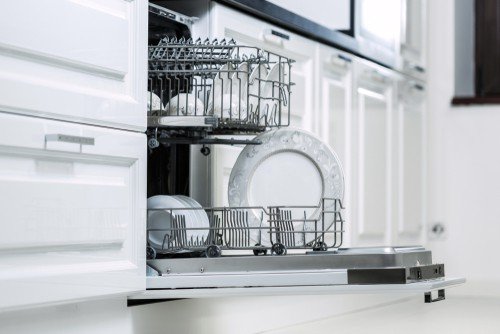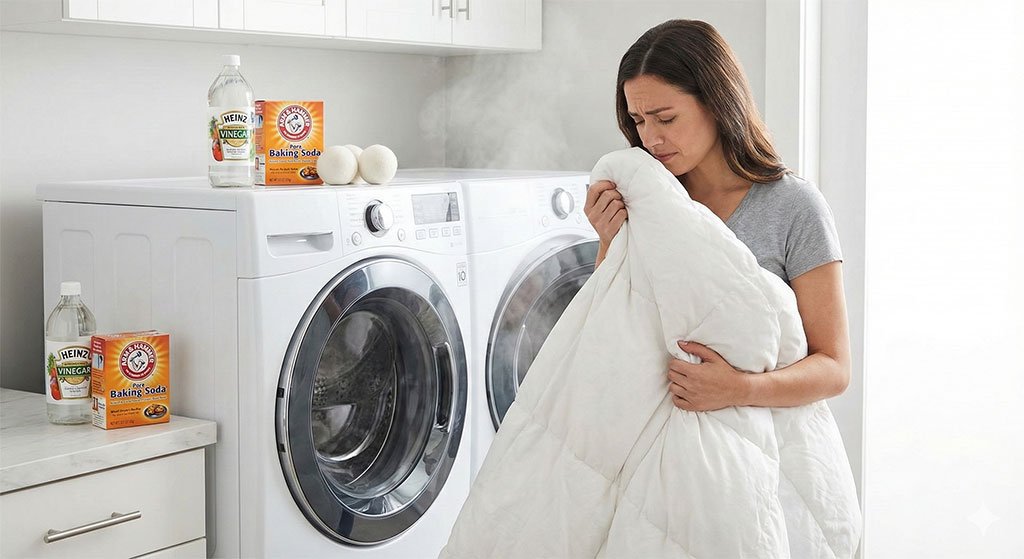If your Bosch dishwasher is not draining but there is no blockage, it can be frustrating. Many times, the issue lies in the drain pump or a problem with the dishwasher’s settings. Knowing how to troubleshoot these common issues can help you get your appliance back to working order quickly.
When your dishwasher fails to drain, check the cycle settings or ensure the door is properly closed. A misconfigured setting may confuse the machine, causing it not to complete the drain cycle. If everything seems right, the problem might be with the drain pump or a faulty component.
Understanding these key points can save you time and worry. Once you know where to look, fixing your Bosch dishwasher can become a straightforward task.

Table of Contents
Understanding Dishwasher Drainage Systems
Dishwashers use specific components to remove water after a wash cycle. Understanding these parts and how they should function can help you identify issues, like a Bosch dishwasher not draining properly.
Components of the Drainage System
Key components in the drainage system include:
- Drain Pump: This pump pushes water from the dishwasher to the drain line. If it fails, water can remain in the appliance.
- Filter: Located at the bottom, filters catch food particles and debris. A clogged filter can restrict water flow.
- Drain Hose: This flexible tube connects the dishwasher to your home’s plumbing. If it’s kinked or clogged, it may block drainage.
- Air Gap: In some systems, an air gap prevents backflow. If this part is blocked, water can’t exit properly.
Each component must work correctly for the system to function.
How Drainage Should Normally Occur
Dishwashers follow a specific process to drain water. Here’s how it should work:
- Cycle Start: After washing, the control board activates the drain pump.
- Water Removal: The pump pushes water through the drain hose.
- Backflow Prevention: The air gap stops dirty water from flowing back into the dishwasher.
- Final Drain: Water exits through the home’s plumbing, leaving the dishwasher empty.
This process ensures your dishes come out clean. When any part fails, your Bosch dishwasher may struggle to drain.
Troubleshooting Steps for Drainage Issues
If your Bosch dishwasher is not draining despite no visible blockages, there are several areas to investigate. Following these steps can help identify and solve the draining issue effectively.
Check for Software Errors
Your dishwasher’s software might occasionally have glitches. To check for errors, start by resetting your dishwasher. This can often solve minor issues.
- Power Off: Unplug the dishwasher or turn off the circuit breaker.
- Wait: Leave it off for about 5 minutes.
- Power On: Plug it back in or turn the breaker on.
After resetting, observe if the draining issue persists. You can also consult your user manual to check for specific error codes that may indicate a software problem.
Assess the Drain Hose
The drain hose is crucial for water exiting your dishwasher. If it’s kinked or improperly positioned, it can prevent proper drainage.
- Inspect the Hose: Check for bends or twists that could block water flow.
- Height: Ensure the hose is installed at the correct height, typically between 18 to 30 inches from the floor.
- Connections: Make sure the connections on both ends (to the dishwasher and the sink drain) are tight and leak-free.
If the hose appears damaged or clogged, consider replacing it or clearing any visible obstructions.
Evaluate the Drain Pump and Impeller
The drain pump and impeller work together to remove water after a wash cycle. If either is malfunctioning, it can lead to drainage issues.
- Pump Inspection: Listen for unusual noises during operation, which may indicate a faulty pump.
- Clean the Impeller: Check for food particles or debris that may be stuck. Remove any blockages to allow for smooth operation.
- Testing the Pump: If you’re comfortable, you can access the pump to check for damage or clogs.
If you suspect a pump failure, it may require professional assistance for replacement.
Maintenance Tips to Avoid Drainage Problems
To keep your Bosch dishwasher draining properly, regular maintenance and careful use are key. Following specific cleaning routines and best practices can help prevent drainage issues.
Regular Cleaning and Care
Cleaning your dishwasher regularly is essential. Start by removing food particles from the filter. Check it weekly for any debris or build-up.
Steps for Cleaning the Filter:
- Remove the filter: Twist or lift it out gently.
- Rinse under water: Use warm water to remove stuck particles.
- Reinstall the filter: Place it back securely.
Additionally, clean the spray arms. Look for clogs in the spray holes and use a toothpick to clear them. You should also wipe down the door edges and gasket to prevent mold. Doing this every month can help maintain good drainage.
Best Practices for Dishwasher Use
Using your dishwasher correctly can stop many drainage issues. Make sure to load dishes properly.
Tips for Loading:
- Place larger items on the bottom rack.
- Avoid overlapping items to ensure water has good flow.
- Face dirty side towards the spray arms for effective cleaning.
Also, be careful with the detergent. Use the right amount and type for your model. Too much detergent can create excess suds, leading to drainage problems. Finally, run your dishwasher on a regular schedule to keep water moving and prevent build-up.
Common Misconceptions About Dishwasher Draining
Many people have misunderstandings about why a dishwasher may not drain properly. These myths can lead to confusion and misdiagnosis of the issue.
Myths About Detergents and Maintenance
Some believe that using more detergent will help with a draining issue. In reality, using too much detergent can create excess suds, making it harder for water to drain. This can cause your dishwasher to act as if it’s blocked when it’s not.
Another common myth is that all detergents are interchangeable. While some may think any liquid or powder will work, this isn’t true. Dishwashers function best with specific detergents designed for their systems. Using the wrong type can result in poor cleaning and draining.
Proper maintenance is crucial. Many users think it’s enough to clean the filter once in a while. Regular checks are necessary to prevent buildup that could affect drainage.
Signs Misinterpreted as Blockages
You might observe water pooling at the bottom of your dishwasher. This doesn’t always mean there is a blockage. Sometimes, it can indicate a full cycle where water hasn’t completely drained.
Strange noises can also be misleading. If you hear clunking or grinding, it may just be food particles in the filter, not a blockage in the drain line. Ignoring these sounds can lead to misdiagnosis of drainage problems.
Another sign is the dishwasher taking longer to complete cycles. While this could suggest a blockage, it may also relate to the drainage pump’s condition. Understanding these signs helps in accurately identifying the actual issue.
Professional Intervention and When to Seek Help
If your Bosch dishwasher is not draining and there is no blockage, it may be time to consider professional help. Some issues can be complex and require a technician with the right knowledge and skills.
Identifying Complex Issues
Sometimes, problems might not be obvious. Common issues include:
- Faulty pump: If the pump is damaged, it cannot push water out.
- Electrical problems: A malfunction in the wiring can disrupt operations.
- Control board failure: If the control board is faulty, it might send incorrect signals.
If you notice any unusual noises, error codes, or persistent drainage issues, these could indicate a deeper problem. Pay attention to any symptoms your dishwasher exhibits. This can help when you talk to a technician.
Selecting a Qualified Technician
Choose a technician who has experience with Bosch dishwashers. Look for these factors:
- Certifications: A certified technician has proper training.
- Reviews: Check online reviews or ask for recommendations from friends.
- Warranty: Ensure the technician provides a warranty for their service.
When you contact a technician, share detailed information about the issue. This can help them prepare for the visit and diagnose the problem faster. A qualified technician can save you time and money in the long run.
Bottom Line
Ensuring your Bosch dishwasher drains properly involves understanding the key components and maintenance routines. Regularly checking the drain pump, hose, and filters can prevent common issues. Misconfigurations in settings or minor glitches can often be resolved by resetting the appliance.
However, professional intervention may be necessary when deeper problems arise, such as a faulty pump or electrical issues. By staying proactive with maintenance and promptly addressing any signs of trouble, you can keep your dishwasher running smoothly and avoid the frustration of drainage problems.


